SCERT AP Board 6th Class Social Solutions 5th Lesson Early Life to Settled Life Textbook Questions and Answers.
AP State Syllabus 6th Class Social Studies Solutions 5th Lesson Early Life to Settled Life
6th Class Social Studies 5th Lesson Early Life to Settled Life Textbook Questions and Answers
Improve Your Learning
Question 1.
List out the products of the forests?
Answer:
Fruits, edible roots and tubers, nuts, seeds, leaves, honey, wild grains, medicinal herbs, fungi and other natural products.
Question 2.
What do you know about nomadic life?
Answer:
A nomad is someone who lived by travelling from place to place. The nomadic lifestyle is likely the oldest form of human society. Nomads generally move from place to place depending upon variables such as climate, season, water availability, food and movement of animal herds.
![]()
Question 3.
How do we use fire today?
Answer:
Today, we use fire
- to cook food,
- to heat the water
- for making steam from coal and water
- for moulding metals
- in rituals,
- in agriculture for clearing land,
- generating heat and light and many more.
Question 4.
Prepare a list of the food items eaten by the early people and the modern people. Do you notice any similarities or differences?
Answer:
| Early people | Modern people |
| Similarities: | |
| Fruits | Fruits |
| Edible roots and tubers | Edible roots and tubers |
| Nuts | Nuts |
| Seeds | Seeds |
| Leaves | Leaves |
| Honey | Honey |
| Differences: | |
| Wild grains | Cooked grains |
| Raw meat | Cooked meat |
| Fishes (uncooked) | Cooked fish |
| Eggs (uncooked) | Cooked eggs |
| Milk | Boiled milk |
Question 5.
“The earliest human life became easier by domesticating animals and plants” Do you agree or not? Support your answer.
Answer:
Yes. We can say that the lives of the earliest humans became easier on domesticating animals because.
- They will provide them with food.
- They help them in pulling cars.
- They are trustful so they can protect them from other animals also.
![]()
Question 6.
If there is no grinding stone, how would it affect our food habits?
Answer:
It would be a little tough for us to have food without a grinding stone. But still, we should remember our ancestors – the primitive humans, they had no grinding stone. But they survived. Instead of eating cooked items, we could eat fruits and vegetables. Our diet would completely consist of plants. We would be more conscious of plants and how to save them since they were our main diet.
But I can say cooking would be difficult without any stone or grinder.
Question 7.
What tools do you use for cutting fruits? What would they be made of?
Answer:
To cut fruits generally, I use a knife. They are made of iron or steel.
Question 8.
Where did the early people store food grains?
Answer:
The early people used large clay pots or woven baskets or fig pits into the ground to store food grains.
Question 9.
List out three ways in which the present lives of farmers and herders are different from that of the early people.
Answer:
- Hunter-gatherers kept travelling from place to place whereas farmers had to live at the same place for longer periods of time to take care of their crops.
- Hunter-gatherers depended on the meat of wild animals whereas farmers and herders used plants, crops and cattle.
- Hunter-gatherers did not have any settled life whereas farmers and herders gradually …… settled in huts, pit houses.
![]()
Question 10.
How did the lifestyle of farmer-herders lead to early civilisations?
Answer:
Farmer herders learnt to plant the seeds they wanted and grow them for food. They attracted animals by leaving food for them. These animals provided them milk, meat and carried loads. They protected them from wild animals. They stayed in a place for a long time taking care of the plants. They learned storing methods of food. So, people began to settle down inconvenient places for a long time. They built houses. They developed new kinds of tools made of stone. Toolmakers created better farming tools. These communities extended to different parts. In this way, the lifestyle of farmer- herders lead to early civilisations.
Question 11.
Locate the following Rock Art Sites on the map of Andhra Pradesh.
A) Chintakunta
B) Adoni
C) Kavali
D) Naidupalli
E) Velpumadugu
F) Srikalahasti
Answer:
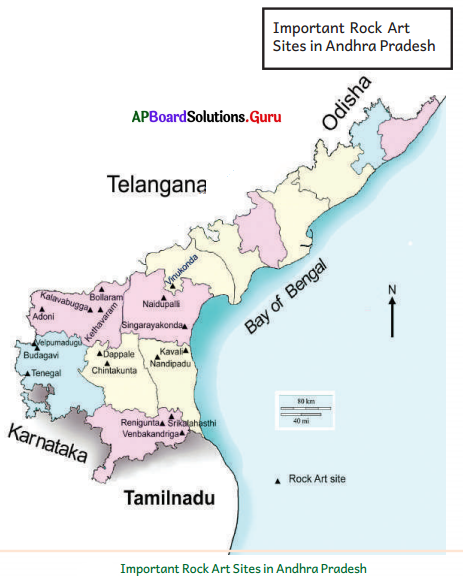
![]()
Project Work
Question 1.
Collect the information about rock painting sites. Write a report and exhibit it in your class.
Answer:
Recently I visited rock painting caves in Akkampalle Village in the Kurnool district with my parents. There are three sites to see. Of the three sites, one is a painted rock shelter locally known as “Mosalla-gundu” (‘Boulder of Crocodiles’), while the remaining two are naturally formed rock caves. Artworks found within the caves reflect the life, culture, traits and beliefs of the era.
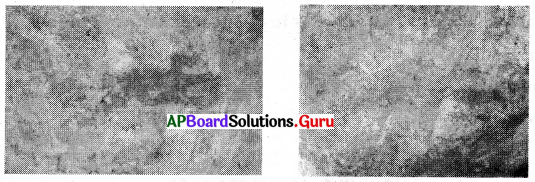
The Boulder of Crocodiles is open on three sides towards the west, north and south, and contains a large number of paintings. The first crocodile is large in size compared with the other two. These paintings may be assigned to the Mesolithic period due to the nature of their depictions and application of red-ochre colour.
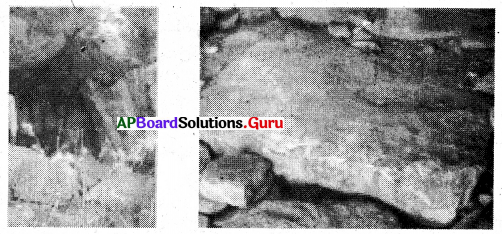
The second cave is a natural rock cave facing north and situated south of the Boulder of Crocodiles. The cave was intentionally closed on three sides with huge boulders, which might have been to offer protection from the cold winds and other natural hazards. The inner face of the cave is decorated with vertical strips of white lime coating.
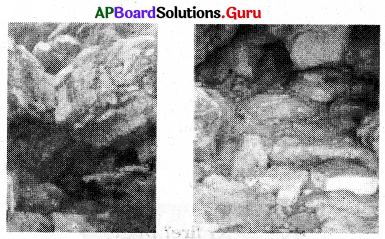
The final cave is a natural formation facing towards the north, which appears to have been used for the purpose of dwelling. Its three sides – east, west, and south – are closed off with huge boulders of quartzite. There is a roughly rectangular area with uneven natural bedrock as its floor.
![]()
Question 2.
Collect some pictures of ancient people and prepare an album.
Answer:
Student Activity.
6th Class Social Studies 5th Lesson Early Life to Settled Life InText Questions and Answers
Let’s Do
Question 1.
List out the activities of early people in the below pictures? (Textbook Page No. 54)
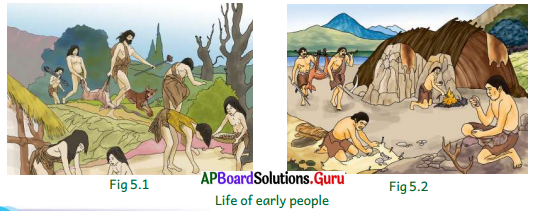
Answer:
Fig. – 1
- People fetching an animal for food.
- Women planting seeds.
- Man searching for something in bushes.
Fig. – 2
- People fetching an animal for food.
- The man was polishing a leather.
- Man trying to lit a fire with rocks,
- A man is frying food on fire.
Question 2.
List the items that you eat which are not grown but collected from the wild. (Textbook Page No. 55)
Answer:
Honey, tamarind, wood apple, nuts, berries, apricot and spices.
Question 3.
Apart from food, list out the other things that we get from the animals. (Textbook Page No. 60)
Answer:
Wool from sheep, silk from the silkworm, pearls from oyster, leather products from snakes, buffalo etc.,
![]()
Question 4.
Make a list of animals and birds that are reared in your area. (Textbook Page No. 60)

Answer:
Animals: cow, buffalo, ox, dog, ass, horse, cat and rabbit.
Birds: Peacock, pigeon, parrot.
Think and Respond
Question 1.
How did the early people discover fire? Discuss with your teacher and write. (Textbook Page No. 55)
Answer:
Perhaps someone discovered fire while making a stone tool. When stones are rubbed or struck against each other, sparks can be seen. Strike means to hit very hard These sparks can start a fire. Maybe, once the sparks set fire to some dry grass or wood nearby. Or, perhaps some people saw a forest fire. When the fire was over they found many wild animals burnt in it. They also probably tasted a piece of the burnt meat and liked the new taste.
The discovery of fire changed the lives of the people forever.
Question 2.
How does the changing climate affect human life at present? Discuss with your teacher, friends and write.
(Textbook Page No. 58)
Answer:
Human health has always been influenced by climate and weather. Changes in climate patterns result in crop loss or drastically reduced yield. Hence more agriculturists are moving away from agriculture to other occupations which are less reliant on climate. The rise in ocean levels has forced people who live by the coastline, to move inwards and pursue other places.
![]()
Question 3.
How did the early humans become herders? (Textbook Page No. 58)
Answer:
People say that they could attract tame animals by leaving food for them. The first animal to be tamed was the ancestor of the dog. They started rearing sheep, goats, cattle, etc. that lived in herds and most of them eat grass! People often protected these animals from being attracted by other wild animals. This is how they became herders.
Question 4.
How can you say the rearing of animals paved the way to a settled life of the early humans? (Textbook Page No. 59)
Answer:
As early humans started farming, they realized that seeds will take time to grow. For this, the early man realized that he has stayed in that place for a long time. He realized that he has to take care of the plants, watering them and protecting them from birds and animals.
Besides, he realized that animals will get multiplied if they are taken care of. He realised that he will get milk and meat from them.
For these reasons, early humans began to settle down inconvenient places for a long time.
Question 5.
Compare the lifestyle of the modern farmers with the early farmers-herders.
Answer:
| Modern farmer | Early farmers-herders |
| 1. They are enjoying settled life. | 1. They enjoyed nomadic life. |
| 2. They market the surplus food. | 2. They shared the food among the group. |
| 3. They receive government help during the time of famines/natural calamities. | 3. They received no help during the time of famines/natural calamities. |
![]()
Question 6.
What will happen if we don’t store food grains? (Textbook Page No. 59)
Answer:
Grains had to be stored for food and seeds. If we don’t store them scarcity arises and there will be no grains to put in the fields.
Question 7.
Prepare a list of articles that are using for cooking and storing in modern days. (Textbook Page No. 61)
Answer:
For cooking, we use gas stoves or electric induction stoves. For- storing we use refrigeration, vacuum packaging, pasteurization, canning, and irradiation.